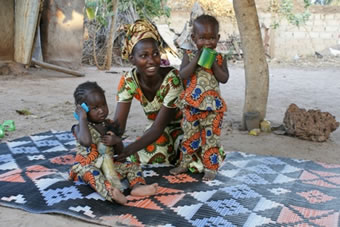Site will be
unavailable for maintenance from June. 4, 11:30 p.m., to June 5, 12:30 a.m. ET. Thank you for your
patience!
Institutional Donors
Doing More, Doing Better: Diverse Funding
For 75 years, child sponsorship has been ChildFund’s primary source of funding, allowing us to make enormous differences in the lives of many children and their family members who live in poverty worldwide.
But we want to reach more and do more.
That’s why, in the last few years, we have begun to broaden our sources of support. Today, while sponsorship is still crucial to the organization, we also receive grants and donations from a variety of donors to support a variety of ChildFund projects. Project funding comes from the United States government, the United Nations and governments in the countries where we work, as well as from foundations, corporations, individual donors and other development organizations, especially our fellow members of the ChildFund Alliance.
These diverse sources of revenue improve the overall health of the organization in several ways:
- The additional support helps ChildFund reach more children and provide access to health care, clean water sources, educational and livelihood opportunities and more.
- Through its relationships with major institutional donors such as the U.S. government, the United Nations, private foundations and other organizations doing work related to ours, ChildFund can tap into to an array of technical expertise that helps us continually improve our programs.
- Likewise, we are able to contribute to a fast-growing body of knowledge in the field of international development.
- ChildFund benefits from institutional donors’ rigorous measurement and evaluation mechanisms, which document both our successes and areas for improvement.
- The governments of countries where ChildFund works also add their support to our grant-funded efforts. When they do, their local investment makes these interventions more likely to continue after ChildFund is gone.
The Possibilities of 1%

“Whether it is fighting hunger, malaria or HIV and AIDS, empowering women and girls, advocating for justice or rebuilding communities after disaster, we are eyewitnesses to the life-changing impact of that small but mighty 1 percent of federal spending we all know as America’s International Affairs budget,” says former ChildFund President and CEO Anne Lynam Goddard.
The 1 percent of which Goddard speaks is the piece of the entire federal budget allocated for the United States’ economic, humanitarian and diplomatic initiatives around the world.
A portion of that 1 percent made it possible for ChildFund to add 3.6 million to the number of children and family members we helped in 2012, thanks to a $40 million grant in 2011 from the United States Agency for International Development (USAID). The grant funds a program to expand access to primary health care throughout Senegal. By the time the grant ends in 2016, 9 million people in Senegal will be connected to the care they need. About half of them are children.
A sampling of ChildFund’s grant-funded programs
Maternal, Neonatal and Child Health program in Honduras (USAID)
Community Services to Vulnerable Groups project (2005-2015) in Belarus (USAID)
Prevention & Response to Child Trafficking in The Gambia (U.S. Department of State/Trafficking in Persons)
Youth Employment Support Project in Sierra Leone in partnership with the World Bank, Sierra Leone Ministry of Youth Affairs and local partner organizations
ABK3 LEAP: Livelihoods, Education, Advocacy and Protection Against Exploitative Child Labor in the Philippines (World Vision Philippines, through a grant of the U.S. Department of Labor)
